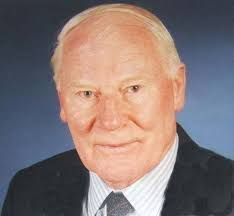1986
Our President in 1986/7 was:
Dr. T. L. Johnston
He proposed the Toast to Sir Walter at our 79th Annual Dinner on Friday 6th March 1987 in The North British Hotel
Download the [transcript] or read the [bulletin]
Summary of the Speech:
Key Themes:
1. Personal Connection to the Borders and Scott:
- Tom Johnston reflects on his upbringing in Liddesdale and how the landscape, local characters, and place names rooted in Border history shaped his youth.
- He draws a parallel between his personal landscape and that of Scott’s early influences, quoting from The Minstrelsy and invoking vivid local memories (e.g. Kinmont Willie, Hermitage Castle, poachers and cattle thieves).
- A humorous aside recalls an old man’s remark about a coughing ewe: “Aye. I doot that yin will no’ hear the cuckoo.” – which Johnston suggests Scott would have enjoyed.
2. Scott’s Economic and Intellectual Context:
- Thomas L. Johnston presents an “economist’s perspective” on Scott, highlighting his indirect contributions to Enlightenment political economy.
- He connects Scott to Heriot-Watt University’s origins and praises his involvement in industrial education (noting his role in the 1821 School of Arts founding).
- Scott’s intellectual inheritance is linked to Enlightenment figures like Adam Smith and Dugald Stewart, with discussion of their moral philosophy and views on justice, commerce, and education.
3. Scott’s Engagement with Economic Themes in His Work:
- Waverley is read as a narrative of economic change, depicting Scotland’s shift from feudal stagnation to integration in commercial modernity.
- Scott subtly critiques Adam Smith’s narrow definition of “productive labour,” asserting that literature and the arts also generate wealth and social value.
- Johnston refers to Scott’s Malachi Malagrowther letters, defending Scottish banks' right to issue notes, as a genuine intervention in monetary debate—not merely a thank-you to bankers.
4. The Union, Identity, and Institutional Distinctiveness:
- Scott saw threats to Scottish legal and institutional uniqueness, and Johnston quotes Scott’s warning about cultural erosion under post-Union pressures.
- The speech reinforces Scott’s awareness of historical forces, the value of national particularities, and the importance of maintaining Scotland’s distinctive systems.
5. The Broad Appeal of Scott:
- Johnston closes with the idea that Scott is a “broad church,” welcoming readers of all tastes and backgrounds.
- The final tone is warm, humorous, and inclusive, recognising Scott as a writer of lasting relevance and human understanding.
Notable Points of Interest:
- Historical Intersections: Johnston’s references to Enlightenment figures, monetary theory, and educational reform place Scott in a more complex, civic-minded role than the typical “romantic novelist” image.
- Self-deprecating Humour: There is levity throughout—remarks on poaching, the coughing ewe, and even Johnston's own “crabbed age” turning to Scott for comfort.
- Scott as Economic Thinker: The speech is unusually focused on Scott’s economic insights, making it stand out in the annual dinner archive.
- Evocative Local Colour: The Liddesdale reminiscences powerfully ground Scott’s literary imagination in physical place, giving life to the Borders as a cultural crucible.
Download the [transcript] or read the [bulletin]

Subsidiary Toasts
After the toast to the Queen had been honoured the Chairman proposed the toast to The City of Edinburgh to which The Lord Provost, The Right Honourable John Mackay replied.
The toast to her Majesty’s Forces was proposed by Sheriff Dr. R. R. Taylor and Vice Admiral Sir George Vallings, Flag Officer, Scotland and Northern Ireland replied.
The Toast to “The Chairman” was proposed by Lord Prosser.


